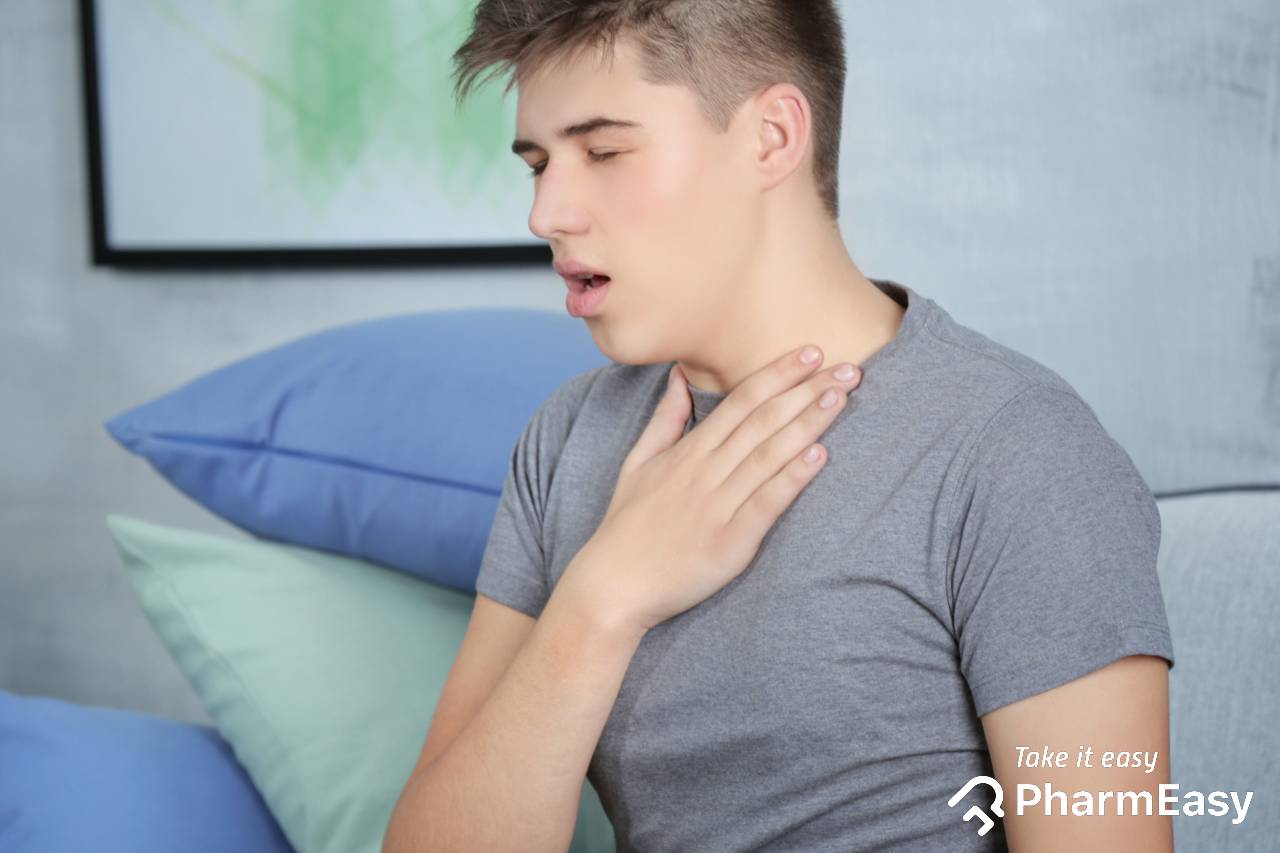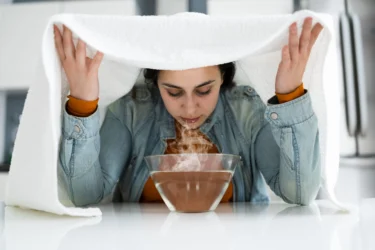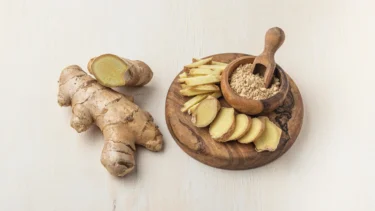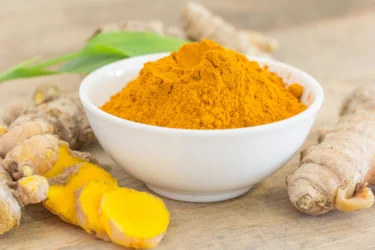Causes and Home Remedies for Shortness of Breath
By Dr. Vishesh Bharucha +2 more

Get,

to manage your symptom
Get your,


4 Cr+ families
benefitted

OTP sent to 9988776655



You’ve successfully subscribed to receive
doctor-approved tips on
Whatsapp

Get ready to feel your best.

Hi There,
Download the PharmEasy App now!!


Register to Avail the Offer
Send OTPBy continuing, you agree with our Privacy Policy and Terms and Conditions

Hi There,
Sign up on PharmEasy now!!
Trusted by 4 crore+ families

OTP sent to 9988776655



You have unlocked 25% off on medicines




Code: NU25
By Dr. Vishesh Bharucha +2 more
Table of Contents
Dyspnoea, commonly referred as shortness of breath or the sensation of suffocation, is a distressing clinical symptom that may arise from various underlying causes. While often associated with respiratory conditions, it can also be triggered or worsened by psychological factors such as acute anxiety or panic.
The COVID-19 pandemic has heightened public awareness of dyspnoea due to its potential association with viral respiratory infections. Although not all cases of dyspnoea are indicative of COVID-19 or other infectious diseases, the presence of such symptoms warrants careful evaluation and appropriate medical attention.

Some people may experience shortness of breath as an acute episode, that is, for a short period. While, others may feel it over the long term as a chronic issue which lasts for several weeks or more. Dyspnoea may occur even after climbing a few sets of stairs or along with common illnesses like a cold1.
Dyspnoea can be caused by a wide spectrum of medical conditions, environmental exposures, and physiological factors, which include2:
In cases where dyspnoea is mild and not indicative of an acute or life-threatening condition, certain supportive measures may be done at home to alleviate symptoms.

Leaning forward while sitting may help reduce the effort for breathing and relax the body. This position releases pressure over the lungs and heart3.
When experiencing breathlessness, try sitting on a chair with your feet flat on the floor and lean your chest slightly forward. Ensure to keep your shoulder and neck muscles relaxed, as this can help reduce respiratory strain and promote more effective breathing.

Breathing deeply by using your abdominal muscles may help to manage breathlessness. Lie on your back on a flat surface and place your hands on your abdomen. Inhale deeply through your nose, letting your abdomen rise as your lungs expand with air. Hold the breath briefly, then exhale slowly. You may also find diaphragmatic (belly) breathing helpful as part of this exercise4.

This is one of the simplest breathing exercises, and it can help to slow your breathing rate effectively. It may be particularly beneficial when shortness of breath is related to anxiety5.
Begin by relaxing the muscles in your neck and shoulders. Next, inhale slowly through your nose for a count of two, keeping your mouth closed. Purse your lips as if preparing to whistle, then exhale gently and slowly through your pursed lips for a count of four.

Many individuals may experience shortness of breath while lying flat during sleep. In such cases, you need to sleep in a propped position as it helps relax the body and airways6.

Sometimes breathlessness may be caused due to the accumulation of thick mucus in the airways which obstructs breathing. Steam inhalation may liquefy the thick mucus and help ease the breathlessness7.
Shortness of breath is a potentially serious clinical symptom and a person should always visit their physician at the earliest, as shortness of breath can be life-threatening; a timely intervention by a physician can avert severe morbidity or mortality.
Dr. Nikhil Yadav , MBBS MD CCEBDM

Drinking black coffee may reduce breathlessness due to the presence of caffeine in it. Caffeine works as a relaxant to the airway muscles. A study8 result suggests that caffeine may slightly improve breathlessness in individuals with asthma.

Ginger has anti-inflammatory properties that help reduce lung inflammation. Drinking warm ginger tea or ginger-infused water may provide a soothing effect and support breathing9.

Turmeric has anti-inflammatory and antibacterial properties that may help with infections. Turmeric milk has traditionally been consumed during episodes of respiratory discomfort since childhood in many households. Turmeric contains curcumin, its active component, which has properties that may help reduce allergic responses and inhibit the release of histamine. These effects may contribute to easing symptoms such as breathlessness.
According to a study10, curcumin may reduce the intensity of an asthmatic attack and its episodes in an asthmatic patient.

Onions are a natural source of quercetin, a plant-derived compound known for its antihistamine and anti-inflammatory properties. Quercetin may help reduce the release of substances involved in allergic responses, potentially supporting respiratory comfort. Onions also contain sulphur compounds, which have been traditionally associated with general respiratory health11.
As part of traditional home practices, some individuals choose to consume a mixture of grated onion and honey, while others place a cut onion by the bedside, believing it may help create a more comfortable breathing environment. These practices should be regarded as supportive and not as a substitute for medical treatment.

Omega-3 fatty acid foods such as fish (salmon and tuna) may help with breathlessness as they help prevent inflammatory conditions that could cause shortness of breath12.
Shortness of breath can result from conditions affecting the lungs or heart and it is critical not to ignore this symptom. Seeking a physician’s advice for clinical examination is necessary to determine the underlying cause of the problem, as treatment options will depend entirely on the diagnosis.
Dr. Arpit Verma , MBBS MD (Pharmacology)
Also Read: H1N1 (Swine Flu): Causes, Symptoms, Treatment, and Prevention
To reduce the risk of experiencing shortness of breath, it is advisable to adopt certain lifestyle changes proactively. These steps may help maintain overall respiratory health and prevent future difficulties1,6:
Also Read: Simple Tips You Can Follow for Heartburn Relief!
There are several reasons that may cause shortness of breath and it is advised to visit a doctor whenever you experience the following symptoms1,6:
Also Read: Pneumococcal Vaccine: Types, Side Effects, and Who Needs It
Shortness of breath can be caused by various factors, including, respiratory infections, asthma, chronic obstructive pulmonary disease (COPD), heart conditions, anaemia, obesity, and anxiety. It’s essential to identify the underlying cause through medical evaluation to determine the appropriate treatment.
Shortness of breath may be considered a medical emergency if it occurs suddenly, is severe, and is accompanied by other symptoms such as chest pain, confusion, bluish discoloration of the lips or nails, or difficulty speaking. These signs may indicate a serious condition, such as a heart attack or pulmonary embolism, requiring immediate medical attention.
Diagnosing the cause of shortness of breath requires a thorough medical evaluation, which may include a physical examination, review of medical history, chest X-rays, pulmonary function tests, electrocardiogram (ECG or EKG), blood tests, and additional specialised tests depending on the suspected underlying cause.
Yes, anxiety or panic attacks may cause shortness of breath. During an anxiety episode, individuals may hyperventilate, resulting in a feeling of breathlessness. Learning stress-reducing techniques and seeking professional help can manage anxiety-related breathing difficulties.
Home remedies for shortness of breath include deep breathing exercises, maintaining good posture, avoiding triggers like allergens and irritants, using a humidifier, staying well-hydrated, and avoiding smoking or exposure to second-hand smoke. However, it is advised to seek medical attention if shortness of breath persists or worsens.
Yes, medications may cause shortness of breath as a side effect. For instance, beta-blockers, ACE inhibitors, and some pain medications may cause breathing difficulties in some individuals. If experiencing any new symptoms after starting a medication, consult a healthcare professional promptly.
Yes, anaemia, a condition characterized by low red blood cell count or low haemoglobin levels, can lead to reduced oxygen carrying capacity in the blood, causing shortness of breath and fatigue. Anaemia should be evaluated and treated by a healthcare professional.
Yes, obesity can contribute to shortness of breath. Excess weight puts pressure on the lungs and diaphragm, making breathing more challenging. Losing weight through a combination of a balanced diet and regular exercise can help improve breathing in obese individuals.
If you experience unexplained or persistent shortness of breath, especially if it affects daily activities, seek medical attention promptly. Additionally, if shortness of breath is accompanied by chest pain, coughing up blood, or any other concerning symptoms, seek immediate medical help as it could indicate a serious medical condition.
Disclaimer: The information provided here is for educational/awareness purposes only and is not intended to be a substitute for medical treatment by a healthcare professional and should not be relied upon to diagnose or treat any medical condition. The reader should consult a registered medical practitioner to determine the appropriateness of the information and before consuming any medication. PharmEasy does not provide any guarantee or warranty (express or implied) regarding the accuracy, adequacy, completeness, legality, reliability or usefulness of the information; and disclaims any liability arising thereof.
Comments

Leave your comment...
You may also like
Comments